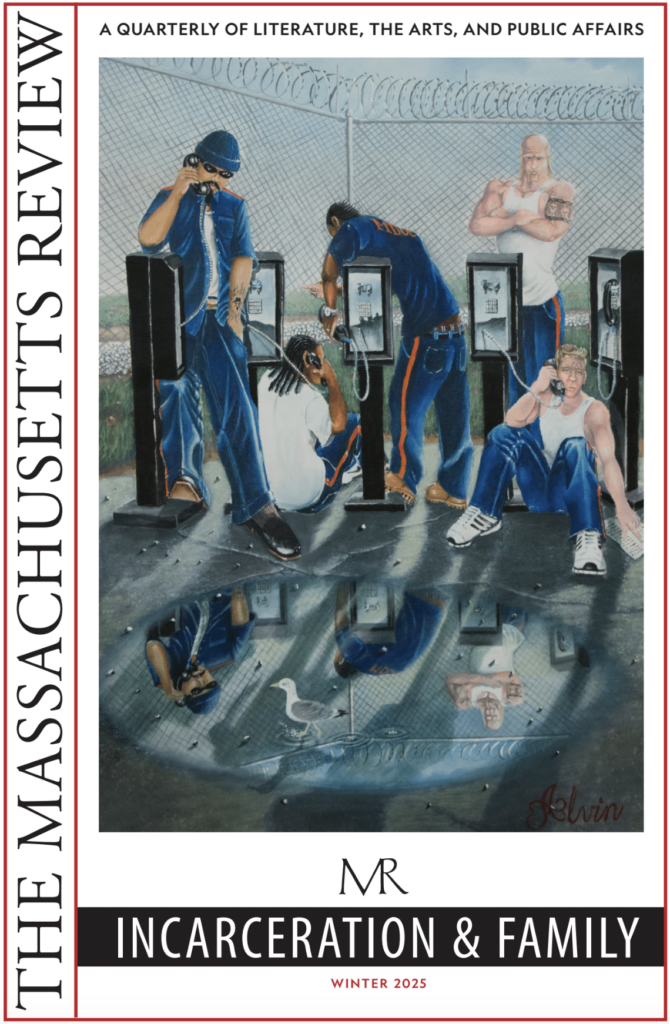(Another) 10 Questions for Elizabeth Knapp

Whenever I feel like an outsider
looking in, I draw a circle around myself
with imaginary chalk & pretend
I’m the center of the universe.
—from “Can America’s Democracy Be Saved?,” Volume 66, Issue 1 (Spring 2025)
Tell us about one of the first pieces you wrote.
I wrote what I consider one of my first real poems in high school, an epistolary poem for my younger brother. Almost 20 years later, I found a typewritten copy as I was packing for a cross-country move, and I ended up reading it at his wedding. (When you’re a poet, friends and family members will invariably ask you to write and read a poem for every wedding and funeral.)
What inspired you to write this piece?
“Can America’s Democracy Be Saved?” opens the second section of my third poetry collection, CAUSA SUI, and is a direct response to the second Trump administration, although it was written before the 2024 election. The second section of the book contains a number of 14-line sonnet-like poems that are structurally, thematically, and tonally very similar to the 14-line sonnet-like poems in my second collection, Requiem with an Amulet in Its Beak. The poems in both books are inspired by Terrance Hayes’s American Sonnets for My Past and Future Assassin (2018), a book that remains as timely now as it was when it was first published seven years ago.
What writer(s) or works have influenced the way you write now?
In addition to Terrance Hayes, the poems in CAUSA SUI are influenced by the work of Nicole Sealey. In particular, the third section of the book, a series of found poems taken from the text of Project 2025, is inspired by Sealey’s The Ferguson Report: An Erasure (2023), a book I read and absorbed deeply last year when I assigned it in one of my college courses.
Do you have any rituals or traditions that you do in order to write?
Not really, although I do have some peculiar habits when I’m putting together a book of poems. For example, I like to print out my drafts, leave them all over the floor, and then step on them. I like the look of a poem that’s been well trodden upon.
Is there any specific music that aids you through the writing or editing process?Not particularly, although I do like to listen to death metal while stepping on my poems.
Who typically gets the first read of your work?
My husband, the novelist Robert Eversz.
If you could work in another art form what would it be?
The visual arts. I was serious about photography throughout high school and college and even did some freelance work abroad after I graduated, but eventually I stopped taking photos and devoted myself entirely to language.
Is there a city or place, real or imagined, that influences your writing?
The United States on the threshold of its demise as a democratic nation is an enduring subject for my work, and as a place of endless contradictions, complexities, and even insanity, this country continues to fascinate and enrage me. As such, the United States is the place that most influences my poems.
My current writing project is a novel of historical fiction about the Egyptian singer Umm Kulthum, so Egypt and specifically Cairo are the next places I’ll be visiting on my writing journey.
What are you working on currently?
My third poetry collection, CAUSA SUI, won the 8th Annual 3 Mile Harbor Book Award and will be published in August/September of this year, so I’m currently working on preparing it for publication, including choosing the cover art (which is always my favorite part of the process).
I’m also taking a sabbatical from teaching next year to work on my novel-in-progress. In addition to taking an Arabic language course, I hope to travel to Cairo next year for research.
What are you reading right now?
Steven Leyva’s The Opposite of Cruelty (2025) and Airea D. Matthews’s Bread and Circus (2023) are two books of poetry I’ve been reading recently. A novel I’m currently reading is The Dream Hotel (2025) by Laila Lalami. Other favorite novels I’ve read in the last year include Behind You Is the Sea (2024) by Susan Muaddi Darraj and James (2024) by Percival Everett.
ELIZABETH KNAPP is the author of Requiem with an Amulet in Its Beak, winner of the 2019 Jean Feldman Poetry Prize, and The Spite House, winner of the 2010 De Novo Poetry Prize. Her poems have recently appeared or are forthcoming in Copper Nickel, North American Review, Pleiades,and The Sun. She teaches at Hood College in Frederick, Maryland, and is a poetry editor for The Baltimore Review.



